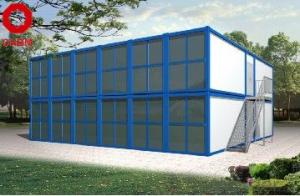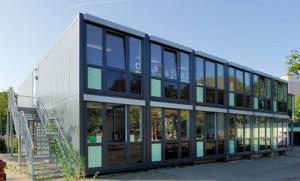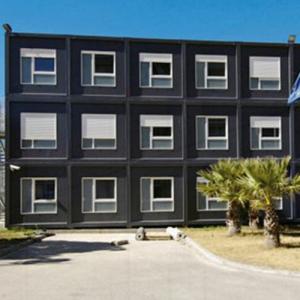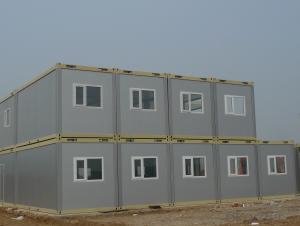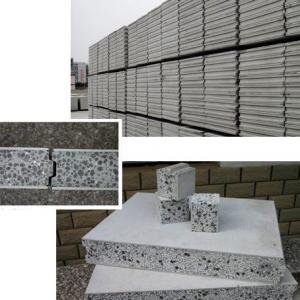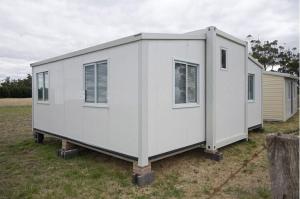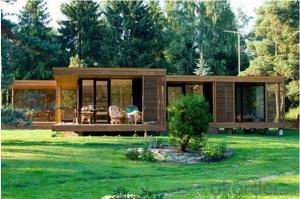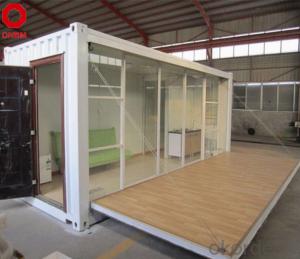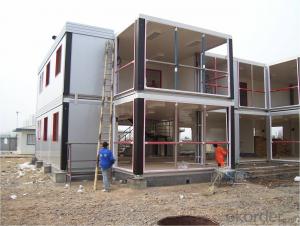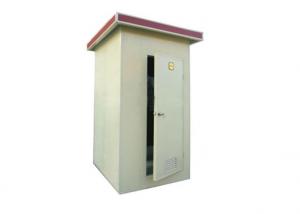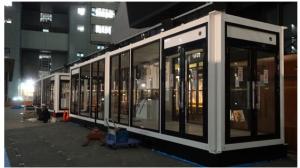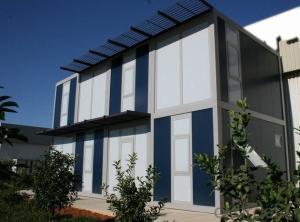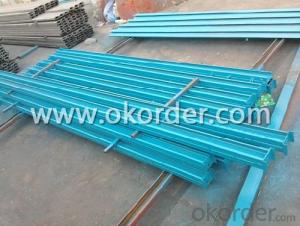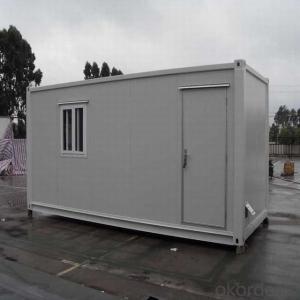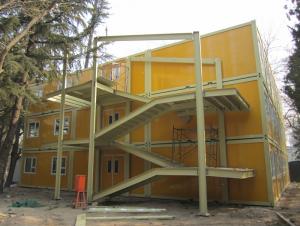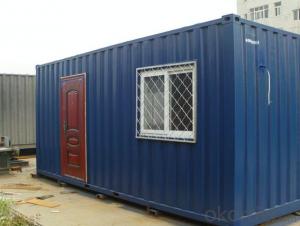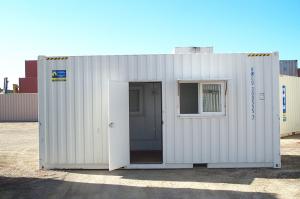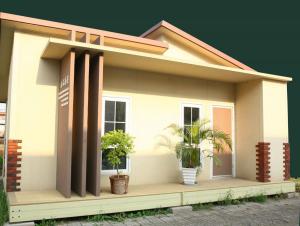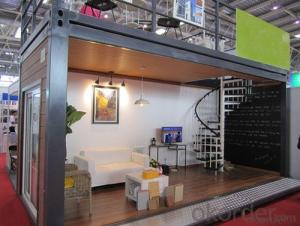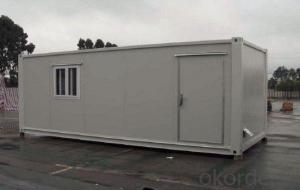Comfortable 40ft Modualr Container House
- Loading Port:
- Tianjin
- Payment Terms:
- TT OR LC
- Min Order Qty:
- 1 set
- Supply Capability:
- 1000 set/month
OKorder Service Pledge
OKorder Financial Service
You Might Also Like
Container House with Prefabricated House ;Movable Container House :
Comfortable 40ft Modualr Container House
40HQ Container
Size: L * W * H = 12192 mm * 2438 mm * 2896 mm
Product features: ISO standard
Load bearing: 30480 KGS/67200 LBS
Tare weight: 3840 KGS/8465 LBS
Maximum payload: 26640 KGS 58735 LBS
2) As a storage tank
Used to store the goods, and we also offer the professional storage container
(3) Modified into a container house
Qingdao Rayfore is a professional manufacturing enterprise, specializes in container buildings
Our company is a group company,engaged in new and used shipping container sales, special containers and various container house.And the priducts are sold to all over the world.
If you have need, contact us .
| Shipping container Specification | ||||
| 20GP | 40GP | 40HQ | ||
| Length | 6058mm | 12192mm | 12192mm | |
| External Dimension(mm) | Width | 2438mm | 2438mm | 2438mm |
| Height | 2591mm | 2591mm | 2896mm | |
| Length | 5898mm | 12032mm | 12032mm | |
| Internal Dimension(mm) | Width | 2352mm | 2352mm | 2352mm |
| Height | 2385mm | 2385mm | 2690mm | |
| Door Opening | Width | 2,337~2,343mm | 2,337~2,343mm | 2,337~2,343mm |
| Height | 2,272~2,283mm | 2,272~2,283mm | 2,577~2,583mm | |
| Internal Capacity | 33.2cum | 67.7cum | 76.4cum | |
| Container Weight | 1,960~2,340kg | 3,710~3,850kg | 3,990~4,250kg | |
| Max Pay Load | 21,660~22,040kg | 26,630~26,770kg | 26,230~26,490kg | |
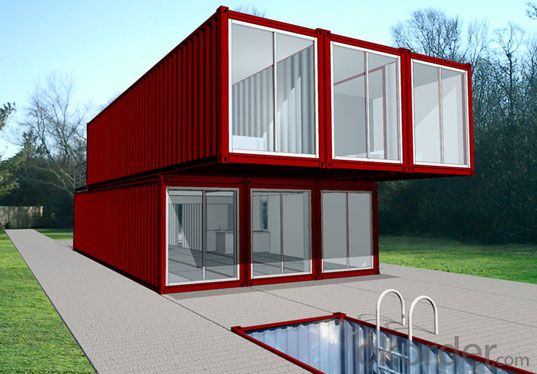
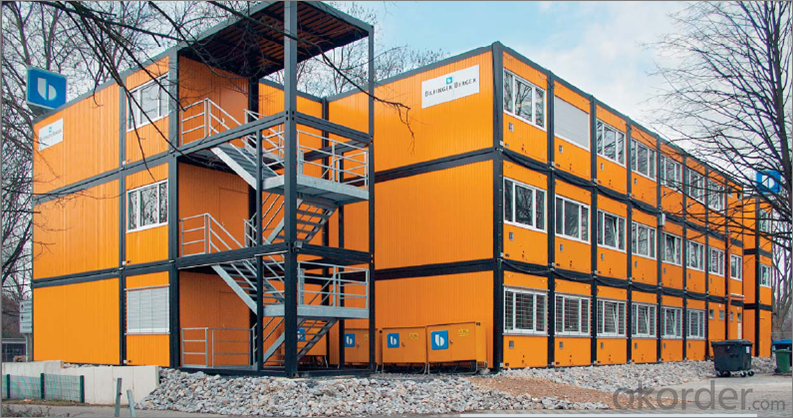
- Q: Can container houses be rented?
- Yes, container houses can be rented. Many companies and individuals offer container houses for rent as an alternative housing option. These rental container houses are typically equipped with basic amenities such as electricity, plumbing, and insulation, making them suitable for temporary or long-term living arrangements. Renting a container house can be a cost-effective and sustainable option for individuals or families looking for unique and flexible housing solutions.
- Q: Can container houses be designed with an industrial or warehouse-style appearance?
- Yes, container houses can definitely be designed with an industrial or warehouse-style appearance. In fact, the modular and versatile nature of shipping containers makes them an ideal choice for creating such a design aesthetic. By utilizing the characteristic features of container architecture, such as exposed metal framework, corrugated steel walls, and large windows, architects and designers can easily achieve an industrial or warehouse-inspired look for container houses. To enhance the industrial aesthetic further, designers may incorporate elements like exposed brick walls, concrete floors, and high ceilings, which are commonly found in warehouses. Additionally, incorporating steel beams, metal staircases, and large rolling doors can further contribute to the overall industrial feel. Moreover, by strategically combining multiple containers and stacking them in different configurations, designers can create unique and visually striking structures reminiscent of warehouse complexes. These multi-container designs can be customized to include features like mezzanine floors, open-plan layouts, and expansive windows, allowing for a seamless integration of industrial aesthetics with modern living spaces. Ultimately, container houses provide ample flexibility in terms of design, making it entirely possible to achieve an industrial or warehouse-style appearance while also ensuring a comfortable and functional living environment. Whether it's for residential or commercial purposes, container houses offer a creative and sustainable approach to architectural design that can be tailored to suit various styles, including the industrial or warehouse aesthetic.
- Q: Can container houses be transported overseas?
- Yes, container houses can be transported overseas. Due to their modular and stackable design, container houses are highly transportable and can be easily loaded onto ships for international shipping. The shipping containers used to build these houses are designed to withstand rough sea conditions and are built to international shipping standards, making them suitable for long-distance transportation. Additionally, container houses can be disassembled and reassembled at the destination, allowing for easy relocation and adaptability. However, it is important to consider the logistics and costs associated with overseas transportation, including shipping fees, customs regulations, and any necessary permits or approvals required in the destination country.
- Q: Can container houses be designed to have open floor plans?
- Yes, container houses can be designed to have open floor plans. The modular nature of container houses allows for flexible and customizable layouts, making it possible to create open and spacious living areas. By removing walls or using large windows and doors, the interior space can be designed to have an open concept, providing a sense of space and flow within the container house.
- Q: Are container houses suitable for permanent or temporary living?
- Container houses can be suitable for both permanent and temporary living, depending on individual needs and preferences. For temporary living, container houses offer a cost-effective and flexible solution. They can be easily transported and set up in different locations, making them ideal for people who frequently move or need temporary accommodations, such as construction sites or disaster relief efforts. On the other hand, container houses can also be suitable for permanent living. With proper insulation, plumbing, and electricity installations, container houses can provide all the necessary amenities for a comfortable and functional home. They can be customized to meet the specific requirements and aesthetic preferences of individuals or families, offering a unique living space. Container houses also have several advantages for permanent living. They are eco-friendly as they repurpose used shipping containers, which reduces environmental impact. Additionally, container houses are often more affordable than traditional houses, making homeownership more accessible to a wider range of people. However, it is important to consider some potential limitations of container houses for permanent living. The limited size of shipping containers may pose challenges for larger families or individuals who require more space. Modifying containers to meet building codes and regulations may also involve additional costs and time. Furthermore, the industrial look of container houses may not appeal to everyone's aesthetic preferences. In conclusion, container houses can be suitable for both permanent and temporary living, depending on individual needs and preferences. They offer cost-effectiveness, flexibility, and eco-friendliness, making them a viable option for various living situations. However, it is crucial to carefully consider the specific requirements and limitations of container houses before deciding on their suitability for a particular living arrangement.
- Q: Can container houses be used as vacation homes?
- Yes, container houses can be used as vacation homes. They offer a unique and sustainable accommodation option for those looking for a different vacation experience. Container homes can be customized and designed to provide all the necessary amenities and comforts required for a vacation stay. Additionally, their mobility allows for placement in various scenic locations, making them an excellent choice for vacation homes.
- Q: Can container houses be designed with renewable energy systems?
- Definitely, renewable energy systems can, indeed, be incorporated into container houses. The compact and modular nature of container homes makes them particularly suitable for integrating renewable energy systems. There are various renewable energy options that can be integrated into container homes. Solar power is a popular choice, where solar panels can be installed on the container's roof to capture the sun's energy and convert it into electricity. This electricity can then be used to power the lights, appliances, and other electrical systems inside the container house. Another option is wind power. By installing wind turbines near the container house, electricity can be generated from the wind. This is especially advantageous in areas with high wind speeds. The generated electricity can be stored in batteries or connected to the grid for use in the container house. Furthermore, container houses can also take advantage of other forms of renewable energy, like geothermal energy or hydropower, depending on the geographical location and available resources. It is important to note that careful planning and consideration are required for the design and implementation of renewable energy systems in container houses. Factors such as energy demand, location, climate, and budget must be taken into account to ensure the most efficient and effective use of renewable energy. In conclusion, renewable energy systems can definitely be incorporated into container houses. By harnessing solar power, wind power, geothermal energy, or hydropower, container homes can become more sustainable and environmentally friendly. This will reduce reliance on non-renewable energy sources and minimize their carbon footprint.
- Q: Can container houses be designed to have a small carbon footprint?
- Yes, container houses can be designed to have a small carbon footprint. One of the main advantages of using shipping containers for housing is that they are repurposed and recycled materials, which reduces the need for new construction materials. This significantly reduces the carbon emissions associated with the production and transportation of building materials. Additionally, container houses can be designed to incorporate energy-efficient features. For example, proper insulation, low-energy lighting, and energy-efficient appliances can be installed to reduce energy consumption. Incorporating renewable energy sources such as solar panels and wind turbines can further minimize the carbon footprint by generating clean, sustainable energy. Furthermore, container houses can be designed to be self-sufficient in terms of water usage. Rainwater harvesting systems, greywater recycling, and efficient plumbing fixtures can help reduce water consumption and minimize the carbon emissions associated with water treatment and distribution. The design of container houses can also prioritize natural ventilation and daylighting, reducing the need for artificial heating, cooling, and lighting. Additionally, the use of sustainable and eco-friendly materials for insulation, flooring, and finishes can further minimize the carbon footprint. It is important to note that the overall carbon footprint of a container house also depends on factors such as the location, transportation of the containers, and the energy sources used in the construction process. However, with careful design and consideration of these factors, container houses can indeed be designed to have a small carbon footprint, making them a sustainable and eco-friendly housing option.
- Q: What are the advantages of living in a container house?
- Living in a container house has numerous advantages that make it an appealing choice for many individuals. Firstly, container houses are remarkably cost-effective. Instead of purchasing or constructing a traditional house, buying a shipping container and converting it into a livable space is significantly cheaper. This affordability enables individuals to save money or allocate their funds to other important aspects of their lives. Secondly, container houses are highly versatile and can be tailored to suit individual needs and preferences. With some creativity and design expertise, containers can be transformed into comfortable and stylish living spaces. They can be customized to include various amenities like windows, doors, insulation, electricity, plumbing, and even multiple stories. The ability to personalize container houses provides individuals with the opportunity to create a unique and customized living environment. Another advantage of container houses is their portability. Shipping containers are designed for easy transportation, allowing individuals to relocate their homes if necessary. This mobility is particularly beneficial for those who value flexibility and enjoy changing their living environment, such as frequent travelers or individuals who frequently move due to work or personal reasons. Furthermore, container houses are environmentally-friendly. By repurposing shipping containers, we reduce the demand for new construction materials, minimize waste, and contribute to sustainable living. Additionally, container homes can be designed to be energy-efficient, utilizing renewable energy sources and incorporating eco-friendly practices like rainwater harvesting. Lastly, container houses can be constructed relatively quickly. Compared to traditional housing, which often takes months or even years to build, container homes can be completed in a shorter period of time. The modular nature of containers allows for faster construction, reducing labor and material costs. In conclusion, living in a container house offers several advantages including cost-effectiveness, customization, portability, sustainability, and faster construction. These benefits make container houses an attractive and viable housing option for those seeking a unique, affordable, and environmentally-conscious living experience.
- Q: Can container houses be rented or leased?
- Indeed, one has the option to rent or lease container houses. Numerous individuals or companies extend the opportunity to rent or lease container houses as an alternative housing choice. Opting to rent or lease a container house can prove to be an economical answer for those seeking temporary or adaptable lodging. These residences can be tailored to suit the renter's desires and requirements, and can be effortlessly relocated to various destinations. Furthermore, renting or leasing a container house grants individuals the chance to embrace the minimalist and sustainable way of life that accompanies residing in a container home, devoid of the obligation to make a purchase.
Send your message to us
Comfortable 40ft Modualr Container House
- Loading Port:
- Tianjin
- Payment Terms:
- TT OR LC
- Min Order Qty:
- 1 set
- Supply Capability:
- 1000 set/month
OKorder Service Pledge
OKorder Financial Service
Similar products
Hot products
Hot Searches
Related keywords
